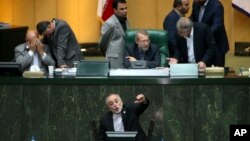A nuclear watchdog’s report on Iran’s past nuclear activities is “unsatisfying” and leaves significant questions unanswered, says a national security expert who reviewed the findings.
“The report really does not tell us that much that we have not known for the last four years,” said Blaise Misztal, National Security Program Director at the Bipartisan Policy Center.
“Iran did very little to contribute any additional knowledge,” he added.
He commented, on Thursday, after the International Atomic Energy Agency (IAEA) released its “final assessment” on Iran’s past nuclear development work, as Iran and world powers move to implement an agreement that would provide Iran with sanctions relief in exchange for its compliance to a plan that would cut its ability to develop nuclear weapons.
The IAEA said most of Iran’s activities related to the development of a nuclear explosive device were conducted before 2003, although some activities continued until 2009.
It also said activities “did not advance beyond feasibility and scientific studies, and the acquisition of certain relevant technical competencies and capabilities.”
However, Misztal said Iran failed to come clean about the full scope of its activities, including a full disclosure of all of the facilities that were used and the names of all of the scientists who conducted experiments.
“If we can’t verify what Iran is doing, then we can’t be confident that they are not still continuing their nuclear program,” he said.
Some U.S. lawmakers are also seeking additional U.S. oversight of the Iran nuclear deal.
In a letter to President Barack Obama, Senate Foreign Relations Committee chairman Bob Corker and ranking member Ben Cardin laid out plans that include a December hearing on the IAEA’s report, as well as a separate hearing on the so-called Implementation Day for the agreement.
The senators also requested testimony from high-level officials, including Secretary of State John Kerry and Energy Secretary Ernest Moniz.
“As the [nuclear agreement] with Iran moves toward Implementation Day, the Senate Foreign Relations Committee will initiate a rigorous program to ensure effective Congressional monitoring and oversight,” the lawmakers said in a Thursday statement.
Steps Towards Sanctions Relief
On October 18, Iran, the U.S. and other world powers involved in nuclear negotiations formally launched efforts to carry out provisions in the Joint Comprehensive Plan of Action (JCPOA), the nuclear agreement reached in July.
When the IAEA verifies Iran’s compliance with provisions, which include reducing its overall uranium enrichment capacity and making significant modifications to its Arak heavy water reactor, the two sides will move to Implementation Day. This yet-to-be-announced day includes the rolling-back of international nuclear-related sanctions on Iran
The JCPOA provides the structure that will “permit IAEA experts and all of our experts to access the data they need to monitor” Iran’s compliance, said State Department spokesman Mark Toner.
However, he added the U.S. has been “clear-eyed” in its assessment that the JCPOA may not “end Iran’s bad behavior elsewhere in the region.”
He commented, on Thursday, after family members of Washington Post reporter Jason Rezaian delivered a petition to Iran’s U.N. mission demanding his release.
Iran sentenced Rezaian to an unspecified amount of time in prison, last month, on conviction of charges that include spying.
Iran Hails IAEA Report
Iranian state media reports say the country’s top nuclear official, Ali Akbar Salehi, praised the IAEA’s findings, saying the case related to Iran’s past and present nuclear activities could now be closed.
“They have failed to refer to any document that could support their claims,” he said.
“The fabricated case which had troubled Iran for years will be closed forever,” he added.
Iran has long maintained that its nuclear program is peaceful, while the U.S. and other western powers have said Iran had nuclear weapons ambitions.





